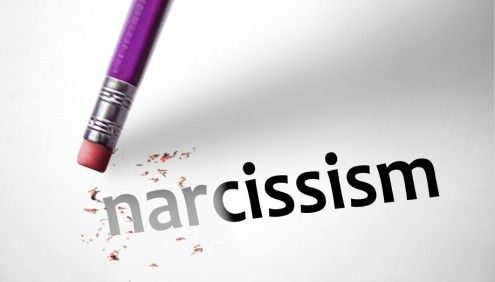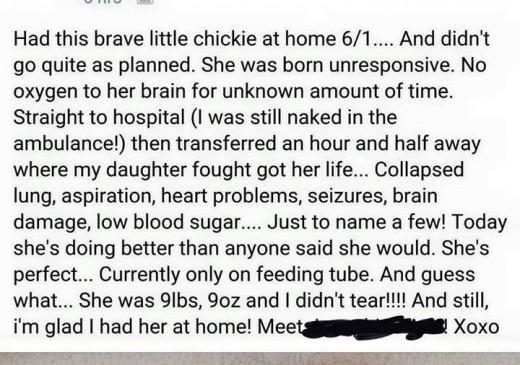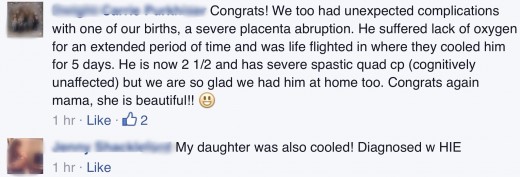I have no words to truly capture the ugly narcissism of some homebirth advocates, but apparently they do.
Had this brave little chickie at home 6/1 … And didn’t go quite as planned. She was born unresponsive. No oxygen to her brain for unknown amount of time. Straight to the hospital (I was still naked in the ambulance!) then transferred an hour and half away where my fought [for] her life… Collapsed lung, spiration, heart problems, seizures, brain damage, low blood sugar … Just to name a few! Today she’s doing better than anyone said she would. She’s perfect… Currently only on feeding tube. And guess what… She was 9lbs, 90z and I didn’t tear!!!! And still, i’m glad I had her at home!
I thought that was perhaps the most horrifying thing I had read from a homebirth advocate, but it was immediately followed by this:
Congrats! We too had unexpected complications with one of our births, a severe placenta abruption. He suffered lack of oxygen for an extended period or time and was life flighted in where they cooled him for 5 days. He is now 2 1/2 and has severe spastic quad cp (cognitively unaffected) but we are so glad we had him at home too…
The callousness and self-absorption defies belief.
[pullquote align=”right” color=””]He is now 2 1/2 and has severe spastic quad cp but we are so glad we had him at home[/pullquote]
Meanwhile, some further fallout from my exposure of 7 homebirth deaths in the past week.
First, the moderators of one of the groups that encouraged these women are still flailing around trying to deny what happened.
Meg Heket is the sister of Janet Fraser, who you may remember, let her own daughter die at homebirth and then declared that her daughter’s death was less traumatic than the “birth rape” she supposedly endured during the birth of an older, healthy child.
When asked about the 7 deaths last week, Meg had this to say:
I don’t even know what babies she’s talking about, I’m sorry. She probably doesn’t know either. She just makes stuff up as she goes along. I genuinely think she’s quite unwell to behave in the callous way she does, it’s not normal. Lot’s of people don’t like homebirth, but they don’t use the deaths of babies to further their agenda. Nor do I use the deaths of women and babies in hospitals to further mine. I actually think women are smart enough to make savvy choices for themselves without me scaring the bejesus out of them.
Can you say “projection,” Meg?
Meg thinks women are smart enough to make choices for themselves ONLY when deprived of information about homebirth deaths and disasters. That’s why she and fellow moderators are ruthless in erasing deaths from their groups.
Second, friends of Monica, the mother whose quote I share when describing the 7th homebirth death have vociferously and repeatedly insisted on my Facebook page that the baby died of congenital anomalies, detailed in a autopsy supposedly completed less than 24 hours after the baby died.
That’s certainly a possibility, so I invited the friends to share the report (with names redacted, of course).
Curiously, after dozens of previous comments and insulting memes, every single friend promptly disappeared and has not returned since.
7 babies died at homebirth in one week and additional babies were injured. Each represents a tragedy, but collectively the stories of their deaths may do some good. They appear to have become a tipping point in the world of homebirth. It’s possible to deny the relationship of one homebirth death to the fact that it took place at home. It is impossible to deny that 7 homebirth deaths across the country in the space of only one week is very strong evidence that homebirth kills babies, babies who didn’t have to die.
It is sad that it has come to this.
Thinking about homebirth? Hopefully, the deaths of these 7 babies will make you think again.







